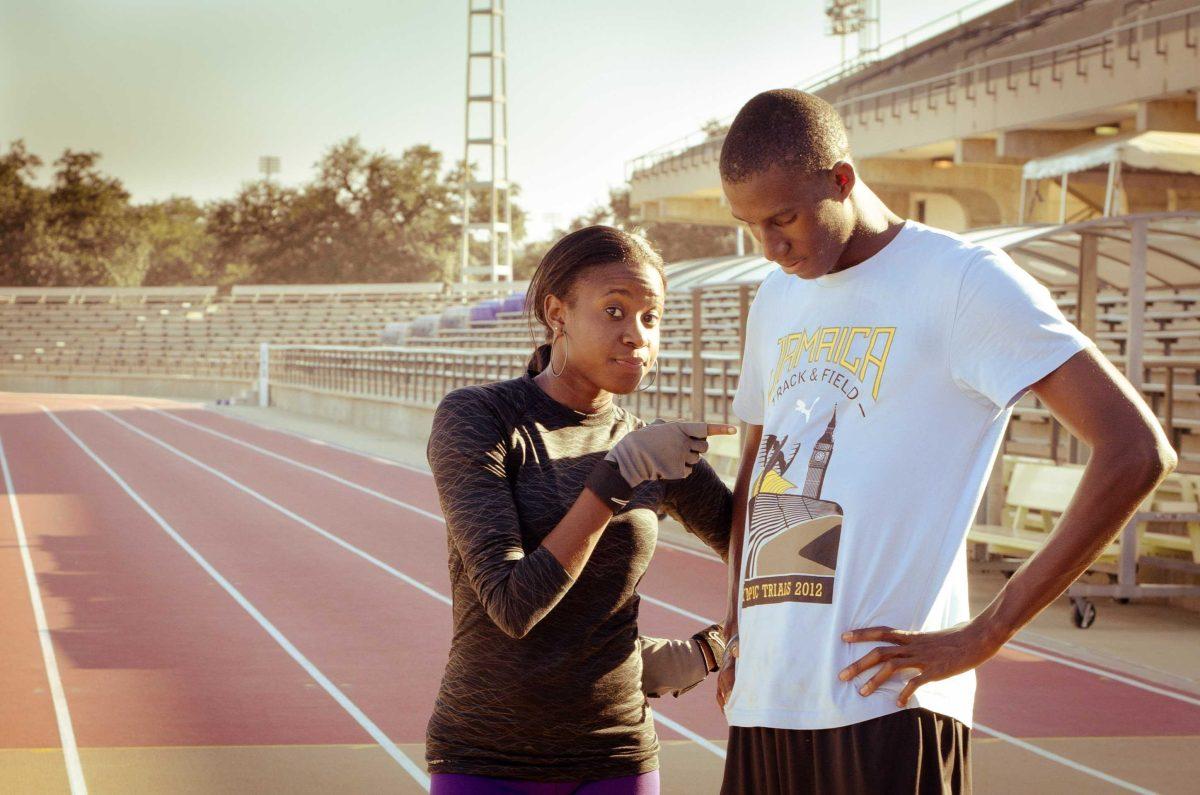Opportunities Taken
Insomnia, daytime fatigue and muscle soreness aren’t symptoms of excitement for college. They’re symptoms of jet lag.
Two Jamaican athletes gave a new meaning to leaving for college when they packed up and headed over 1,000 miles to become members of LSU’s nationally ranked Track and Field team.
Fitzroy Dunkley, a sophomore jumper from Trelawny, and Shanice Hall, freshman jumper from Portmore, St. Catherine, explained it’s because of the opportunities afforded to them by LSU.
“You have to ask yourself, ‘where is the best opportunity,’” Dunkley
explained.
For both students, the University’s training facilities and education program presented the best option.
Hall explained, “In Jamaica there are no tracks. We train on grass,” she said. “If we needed a facility we’d have to go to the boy’s school.”
Hall’s high school also lacked sports medicine trainers. Only career-ending injuries called for a physical therapist. There wasn’t a place for her to go after a long day at practice to ice a sore knee or have a trainer massage out a cramp.
“If you’re injured you might as well stay injured,” Dunkley added. “They [facilities in Jamaica] don’t have the proper equipment to heal you.”
LSU offers athletes access to sports psychologists, which according to Hall, isn’t available to the athletes in Jamaica. There is someone there to talk to if an athlete is feeling uneasy
about themselves.
“Now I have someone to talk to who is just for me if I’m not feeling confident in myself or my abilities,” Hall said.
Using the Opportunities
According to Hall, the knowledge of being a student athlete motivates her and Dunkley every morning.
“We’re student athletes, students first,” she said.
Hall knows she must push herself both physically and academically to stay at LSU. That means going to classes and tutoring every day and attending what she calls “voluntary
mandatory practice.”
The team has practices that aren’t led by the coaches and participation is on a voluntary basis due to NCAA practice hour limitations. The athletes are permitted to go out on their own and train. According to Hall, the voluntary practices are a time to better her performance without pressure from the coaches.
Building a Family
Hall has been at LSU since August 2012 and said she is still adjusting to living in a new country. She credits the family she has built with her teammates for helping with the adaptation.
Dunkley, who arrived in January, agreed. Coming in the middle of the school year and picking up track and school at the same time yielded him no time at all to adjust. He said his teammates helped him adapt quickly.
The teammates are not alone. Other members of the track and field team from Jamaica smoothed the transition for Dunkley and Hall.
“Of course it’s easier to get along with people who are just like you,” Dunkley said.
Nethaneel Mitchell-Blake, another member of the track and field team, arrived in the fall of 2012 from the same high school as Dunkley. Dunkley said the distance from home brought the two closer together and helped to form a brother-like bond.
Hall said having other Jamaican teammates made the transition to LSU easier.
“You can talk in your own dialect and there are certain jokes you can say that they will get,” Hall said. “Sometimes we let them in on the jokes, but it’s funnier not to.”
Hall ended one of the team’s weekly inspirational speeches with a Jamaican idiom, “you can’t plant corn and reap the peas,” and received blank stares from her teammates. Teammate Nataliyah Friar laughed while explaining the team knew what Hall meant, but it was funny because it wasn’t a metaphor they were used to hearing.
Dunkley and Hall speak in their native dialect at practice so much that their teammates have caught on, often
telling one another to “bill” instead of chill, or take it easy. Hall mocked a few of her teammates at a Wednesday practice and they retaliated by picking her up and swinging her in the air.
Getting to know the team outside of the classroom has also helped Hall in her transition at LSU. She began going to Fellowship of Christian Athletes, an on-campus organization that combines Christian values with the experiences athletes often face to help them become better athletes and better people.
Hall was able to interact with teammates in a different environment and helped build a stronger bond with them.
Building a Family
Dunkley and Hall stay motivated by reminding themselves of their futures whenever they get homesick.
If she could have, Hall would have taken the opportunity to go to school and jump at home while Dunkley disagreed. He doesn’t think being over 1,000 miles from friends and family is as bad as it sounds.
“It’s like being from New Orleans and coming to school in Baton Rouge, your family didn’t come with you and mine didn’t either,” Dunkley said. “We have Skype, so it’s okay.”
Dunkley described the move from Jamaica to America as a normal part of moving forward in life and in one’s career. Moving forward doesn’t mean home is left behind.
“I miss curry chicken and turkey necks and, oh my goodness, ackee and salt fish,” Hall said. Dunkley quickly agreed.
The two don’t have plans to go back home any time soon, but that’s okay because Hall loves it at LSU.
And as for Dunkley, “It’s everything I expected.”
Long Jump from Home: LSU Athletes Share Differences Between Jamaica, U.S.
November 11, 2013



